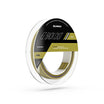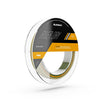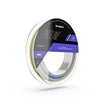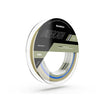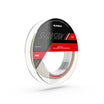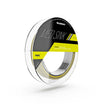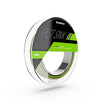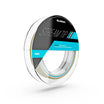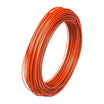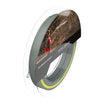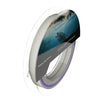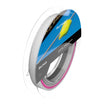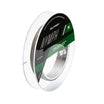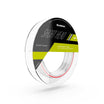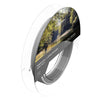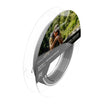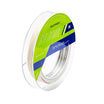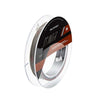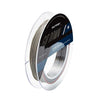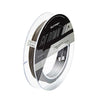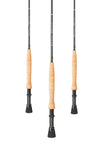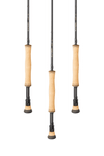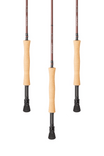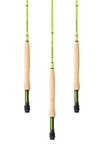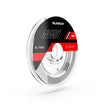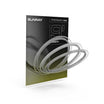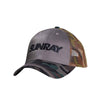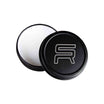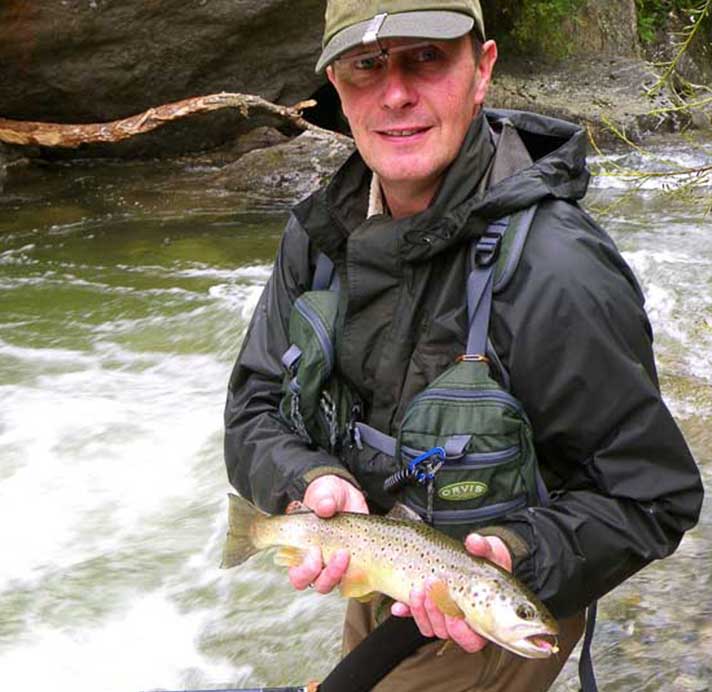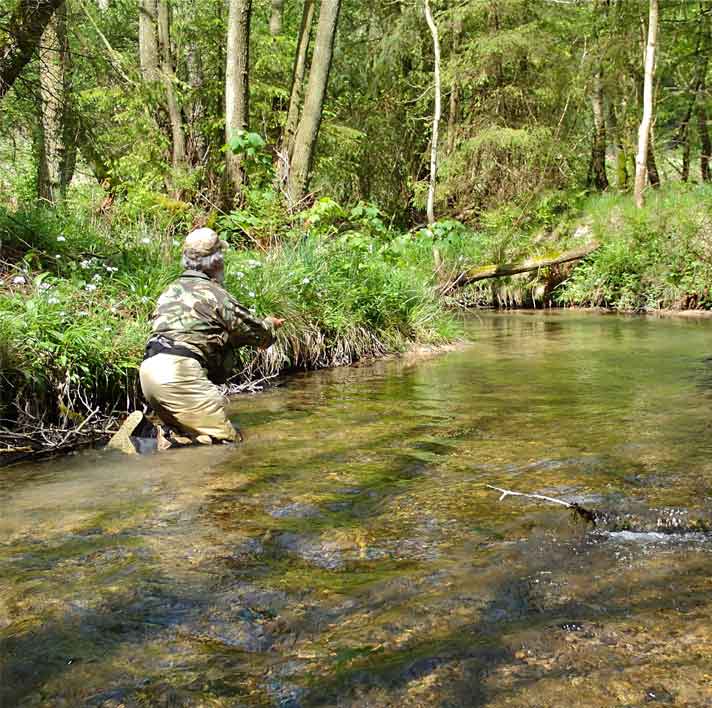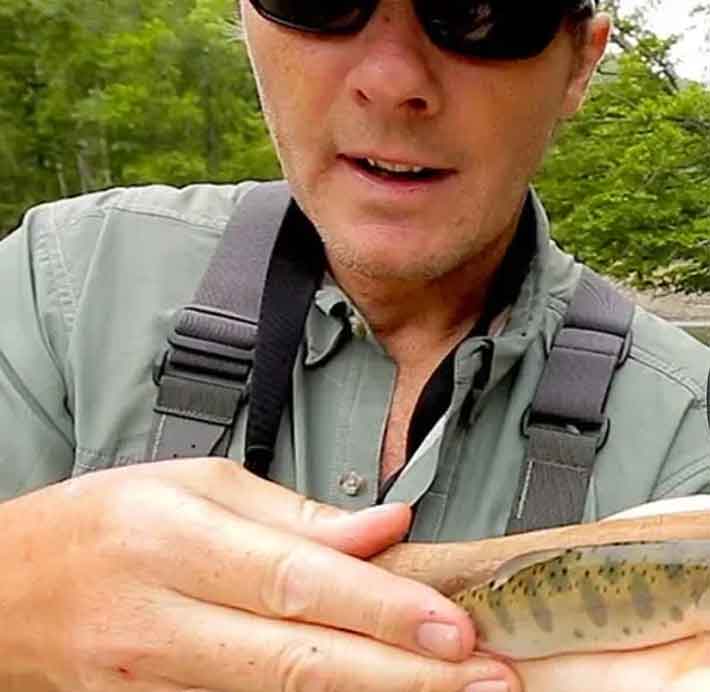Fly Fishing for me.
Modern day fly fishing anglers are very lucky since we can ride on the backs of so many top anglers who defined fly fishing before us. Over the years I have accrued a vast amount of knowledge on fly fishing largely thanks to the articles, books, videos, plus direct contact with other fly fishers.
In the late 1960s & early 70s my early sojourns into fly fishing were greatly influenced by the writings of Richard Walker, G. E. M. Skues, Frank Sawyer, Oliver Kite, Eric Horsfall Turner, Tom Ivens & Geoffrey Bucknall. In those early years I fly fished with my friend Pete Lancaster, with whom I’d coarse fished for several years earlier. Pete was a traditionalist, favouring an 8’ 4 weight split cane rod and spider patterns, Teal Blue & Silver, Bloody Butcher & Mallard & Claret, whilst I had built several fly fishing rods from Hardy’s Fibatube (fiberglass) blanks (a 7’ 4/5 weight, 6’ 3/4 weight & 8’ 4 weight) although I did also poses a 10’ 5 weight cane rod bought second hand several years earlier & used for upstream worming before I got into fly fishing. My choice of flies included Sawyer’s Pheasant Tail Nymph, Oliver Kite’s Pheasant Tail Spinner & Imperial, Dick Walker’s Pink Shrimp (variants in magenta/pink & orange) & a range of Spiders (Snipe & Purple, Partridge & Orange & March Brown, etc.)
Fly fishing in the 70's
In 1970 having gained qualifications at York University I moved to a job in Harpenden, Hertfordshire, with the Ministry of Agriculture Fisheries & Food. My fly fishing was mainly limited to a small cress-bed in the Lee Valley which friends & I cleaned out & converted into a small lake stocked with rainbows & browns. I fished there mainly with small Buzzers suspended under a dry fly. Occasional visits were made to the Midland Reservoirs, particularly Pitsford & also Haningfield in Essex, using a rod built from a 9’ coarse blank, home made 8 weight shooting head, plus flattened nylon/Tapeworm backing/shooting line & lures such as Dick Walker’s Sweeny Todd & Tom Ivens’ Jersey Herd.
In 1974 I returned to Yorkshire to take up teaching in Bridlington & with Pete Lancaster (who lived nearby in York) I got heavily into rock climbing putting my fishing on hold for over 20 years, subsumed by rock climbing, ice climbing, mountaineering, cross country skiing & from the early 1980s mountain biking. Fortunately or unfortunately in 1998 whilst trying to elegantly fall off a mountain bike at high speed (& failing!) I tore the ligaments down one side of my back. One weekend when my mountain biking buddy, Steve Donohue, asked me if I was biking I mentioned that my back was too bad so I was getting my old rods out of the loft & going chub fishing. “Oh you used to fish did you!” was Steve’s reply. Despite biking with Steve for 5 years I never knew that he was a fly fisherman & thus my recent journey began. In the winter of 1998 Steve invited me to join him on a local syndicate small still water near Scarborough, where despite my rusty casting & 7’ 4/5 weight rod with 30 year old line I managed to land a couple of rainbows. Furthermore Steve told me that there was a very short waiting list for the Yorkshire Derwent Anglers’ Club & that those on the waiting list could fish the uppermost 3 miles of the river.
Fly Fishing in the 90's
In 1999 I applied for membership of the DAC & had great sport on the Upper Water, catching nearly 400 fish. I subscribed to Fly Fishing & Fly Tying magazine & soaked up all I could from the writings of Oliver Edwards, Stuart Crofts & David Calvert, Charles Jardine & Malcolm Greenhalgh. My old fly patterns were replaced by Paraloop versions of Oliver Kite’s Pheasant Tail Spinner & his Imperial & the nymphs by gold Bead-head Pheasant Tails & Hare’s Ears. My old rods were soon replaced by an 8’ Hardy 4 weight Gem made from carbon fiber & a six piece 5 weight travel rod ready for the year 2000 when I went on a 1900 miles mountain bike tour of the Yukon & Alaska starting at White Horse on the Yukon River & traveling in a circuit via Dawson City, Fairbanks, the Denali Park & Haines Junction. I made sure that most of my overnight camping spots were near to a river or lake & thanks largely to what I had gleaned from my readings in FF & FT magazine I caught good numbers of arctic grayling, dolly varden char, rainbow trout & lake trout (all small except for a couple of 40cm grayling from Kluane Lake).
In 2002 Steve Donohue & I visited Southern Ireland, staying with Andrew Ryan at the Conolav Centre & fishing the River Suir, Tar & Nire, lovely rivers with amazing hatches. Andrew introduced us to the advantages of long leaders, 12’ tapered leaders with 3 or 4’ of extra tippet to reduce the problems of drag & keep the hefty fly line well away from the fish, thus reducing the chance of spooking them. Steve also had a casting lesson from Andrew & by watching I learned how to do the Jump Roll Cast, Reach Cast & a form of Under Arm Jump Roll Cast for getting a fly low under the overhanging trees. We caught loads of trout & I was starting to feel that I was becoming reasonably proficient.
The next person to have significant impact on my fly fishing was Mike Kendall, 14 years old at the time, 2003. He was one of my students at Driffield Secondary School & he showed great interest when I gave a lesson on the food web of our local Driffield Beck & he told me that he had just started to fly fish. As a result I invited him (with his parents’ permission) to join me on the Yorkshire Derwent & Pickering Beck. He was a natural, soaking up all that I had to teach him. In 2004 he succeeded in winning the Today’s Flyfisher Magazine Stop Watch Challenge in which he had to tie all the flies he needed for the day, then catch 4 grayling from a very high & coloured River Nidd, the prize was a Veniards fly tying kit & a top of the range Hardy Angel rod: I don’t know who was more delighted, Mike or me! At times I learned as much from him as he did from me. In particular he taught me to not be constrained by preconceived ideas & long held doctrines. His mind was unfettered by many of the ‘old wives tales’ that we often see repeated in the angling press. Mike & I are still in regular contact 15 years later, even though he now lives in Australia & when he visits the UK he always has a day or two fishing with me.
In 2007 my first articles on fly fishing was published in Fly Fishing & Fly Tying Magazine & the Grayling Society Magazine & I am much indebted to Mark Bowler & Rod Calbrade who gave me the opportunity to publish my thoughts on the subject after the editor of another well known magazine had not even acknowledged the receipt of a couple of articles that I had submitted to him. Writing has helped me to rationalize my approach to fly fishing & hopefully by sharing my experiences I have helped to put something back into the sport by helping others, who like myself are on this continuous journey of exploration & learning.
A major break through occurred in the winter of 2010, Robin Goldthorpe, a member of my local Beverley Fly Dressers’ Club asked me what I knew about Tenkara. Having only read a historical article about it the previous February in FF&FT magazine I had to confess that I knew virtually nothing other than that it was an ancient fixed line method used in Japan & similar to what Izaak Walton used in the 1600s. However it prompted me to look the subject up on the internet & thanks to Daniel Galhardo’s excellent videos on the Tenkara USA website I realized the incredible potential of Tenkara for achieving drag-free drifts in waters with complex flows & particularly on the high alpine streams of Austria that Steve Donohue & I had been visiting for several years. We had resorted to ‘high sticking’ with 10’ 4 weight rods & long leaders to help us hold line off the surface whilst fishing big dry flies. It was obvious to me that long, light, Tenkara rods teamed up with very light level lines (early on I used 15lb/0.35mm copolymer sea fishing line) would be far superior to our conventional set up & so it proved, increasing our catch rate 4 or 5 fold on tricky pocket water. My early trials with Tenkara during December 2010 were a revelation: I caught more grayling than I would have expected to even fishing maggots with trotting gear & I fished with no problems in subzero temperatures down to -13 degrees C. There were no rod rings to freeze up; I could fish with one hand in a warm pocket & I could fish with thick gloves (only needing to take them off to unhook a fish). The presentation of nymphs, Czech nymph style was outstanding. I was sold on the technique. Not only is Tenkara superb for achieving drag-free drifts, but it is outstanding for the application of subtle movements to both dry & wet flies in order to induce fish to ‘take’. In 2011 I introduced Stuart Crofts to Tenkara & he was an instant convert.
In 2012, rather belatedly I decided to try out French Nymphing with a carp shock leader that Stuart Wardle had given me several years earlier & I also experimented with Jeremy Lucas’s Leader to Hand technique for dry fly fishing. I have fished with Stuart & had the pleasure of attending some of his talks & fly tying demonstrations; he is a top angler & it is thanks to him that I was introduced to Roman Moser Miracle Float, a superb floatant for dry flies, particularly CdC flies. I’ll say more about Jeremy later.
Another significant milestone was when Emanuele Gonetto introduced me to Massimo Magliocco, Phil Bailey & the Italian Casting Team at a lake near Derby in the summer of 2013, followed by 5 days of intensive training at Ascoli, Central Italy, in the November of that year, thanks to the kind invitation of Massimo. The Italian Style of casting dry flies has allowed me to catch fish that I could never have caught before. Its high line speed & tight loops facilitate casting into the wind & deep under overhanging trees, whilst the fly-first presentation, light lines used (typically 1 to 2 line weights less than the rod’s designation) & long leaders (5m) have significantly reduced the chance of spooking fish.
In 2016 Glen Pointon’s innovative approach to fly fishing impacted on me in two ways, firstly I bought one of his floating nets, a major break through in fish care & secondly he very kindly sent me some of the luminous, watch makers’ powder which I used to tie up some of his luminous Bubble Caddis & Spinner patterns, just brilliant for fishing into the dark. More recently (September) 2018 I tied up some of his Soft Touch Shrimps, which have a coating of Silicone: their soft texture reduces the risk of the fish spitting them out & initial trials show them to be very effective.
Another quantum change came in 2016 when Tom Bell of Sunray asked me to write a regular blog for his website. He made it quite clear that he did not expect me to endorse his products but kindly sent me a couple of Jeremy Lucas micro thin lines to try out (a 1 weight which I used on my 2 & 3 weight rods & a 3 weight which I used on a 4/5 weight rod). This I duly did & was mightily impressed with how well they cast & the incredibly delicate presentation. I did, as mentioned in earlier blogs use them with a 12’ leader set up even though Tom & Jeremy recommended just adding 6’ of tippet. These lines have become my ‘go to’ lines for most of my fly fishing.
Then in 2018 Tom sent me 2 rods to play with. The first was a Jeremy Lucas Volition 10’ 2 weight. The performance was even better than my previous favourite long, light line rod, a 10’ 2 weight Greys Streamflex. It cast a 1 weight Jeremy Lucas line like a dream & even cast a 0.55mm diameter micro nymph line plus 12’ leader a decent distance. Furthermore it effectively cushioned a 0.09mm diameter tippet even when playing trout of over 3lb. I thought it was probably the ultimate in super-light line rods until he sent me a prototype of his 10’ 6” to 11’ 6” ZERO rod, which will cast everything from a 2 weight DT line to a 2.5 weight/10lb/0.25mm diameter Tenkara line & will cope with fish over 3lb (see my blog reviewing it).
I have been incredibly lucky over the years to have met, & in many cases fished with, many other incredibly generous & talented anglers, including Stuart Minnikin, Don Stazicker, Kenny Hall, Paul Gaskell, John Pearson, Clark Coleman & many others to whom I owe so much.






